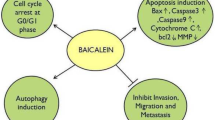Abstract
Background
Botanical therapies are often used by breast cancer patients yet few clinical trials have evaluated their safety and efficacy. We studied mechanisms of activity and performed a phase I clinical trial in patients with advanced breast cancer to evaluate BZL101, an aqueous extract from Scutellaria barbata.
Methods
Preclinical studies were conducted in vitro to characterize cell death induced by BZL101. In a phase I trial, eligible patients had histologically confirmed, measurable metastatic breast cancer. Treatment consisted of 350 ml per day of oral BZL101, administered as sole cancer therapy until disease progression, toxicity or personal preference to discontinue. Primary endpoints were safety, toxicity and tumor response.
Results
BZL101 extract induced strong growth inhibition and apoptosis of breast cancer cell lines. In the phase I trial, 21 patients received BZL101. Mean age was 54 years (30–77) and mean number of prior treatments for metastatic disease was 3.9 (0–10). There were no grade III or IV adverse events (AEs). The most frequently reported BZL101-related grade I and II AEs included: nausea (38%), diarrhea (24%), headache (19%) flatulence (14%), vomiting (10%), constipation (10%), and fatigue (10%). Sixteen patients were evaluable for response. Four patients had stable disease (SD) for >90 days (25%) and 3/16 had SD for >180 days (19%). Five patients had objective tumor regression, one of which was 1 mm short of a PR based on RECIST criteria.
Conclusions
BZL 101 inhibits breast cancer cell lines by inducing apoptosis. In a phase I clinical trial, BZL101 was safe and had a favorable toxicity profile. BZL101 demonstrated encouraging clinical activity in this heavily pretreated population.




Similar content being viewed by others
Reference
Cragg GM, Newman DJ (2005) Plants as a source of anti-cancer agents. J Ethnopharmacol 100:72–79
Bulletin of the World Health Organization (2002) 80:610
Boon H, Wong J (2004) Botanical medicine and cancer: a review of the safety and efficacy. Expert Opin Pharmacother 5:2485–2501
Vickers AJ, Kuo J, Cassileth BR (2006) Unconventional anticancer agents: a systematic review of clinical trials. J Clin Oncol 24:136–140
Zhu YP (1998) Chinese materia medica: chemistry, pharmacology and applications. Harwood Academic Publishers; Amsterdam p 210
Campbell MJ, Hamilton B, Shoemaker M, Tagliaferri M, Cohen I, Tripathy D (2002) Antiproliferative activity of Chinese medicinal herbs on breast cancer cells in vitro. Anticancer Res 22:3843–3852
Shoemaker M, Hamilton B, Dairkee SH, Cohen I, Campbell MJ (2005) In vitro anticancer activity of twelve Chinese medicinal herbs. Phytother Res 19:549–551
Therasse P, Arbuck SG, Eisenhauer EA, Wanders J, Kaplan RS et al (2000) New guidelines to evaluate the response to treatment in solid tumors. European Organization for Research and Treatment of Cancer, National Cancer Institute of the United States, National Cancer Institute of Canada. J Natl Cancer Inst 92:205–216
Diggle PJ, Heagerty PJ, Liang K-Y, Zeger SL (2002) Analysis of longitudinal data, 2nd edn. Oxford University Press New York (NY)
Lee ET, Wang JW (2003) Statistical methods for survival data analysis, 3rd edn. John Wiley & Sons; Hoboken (NJ)
Powell BC, Fung P, Jackson J, Dall’Era J, Lewkowicz D, Cohen I, Smith-McCune K (2003) Aqueous extract of herba Scutellaria Barbatae, a Chinese herb used for ovarian cancer, induces apoptosis of ovarian cancer cell lines. Gynecol Oncol 91:332–340
Author information
Authors and Affiliations
Corresponding author
Additional information
This clinical trial was supported by the California Breast Cancer Research Program IDEA Award CA-BCRP 7WB-0055. We thank Dr. Laura Esserman for encouraging rigorous scientific research in the area of botanical medicine at the University of California, San Francisco Carol Franc Buck Breast Care Center.
Rights and permissions
About this article
Cite this article
Rugo, H., Shtivelman, E., Perez, A. et al. Phase I trial and antitumor effects of BZL101 for patients with advanced breast cancer. Breast Cancer Res Treat 105, 17–28 (2007). https://doi.org/10.1007/s10549-006-9430-6
Received:
Accepted:
Published:
Issue Date:
DOI: https://doi.org/10.1007/s10549-006-9430-6




